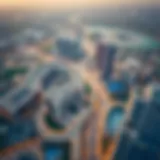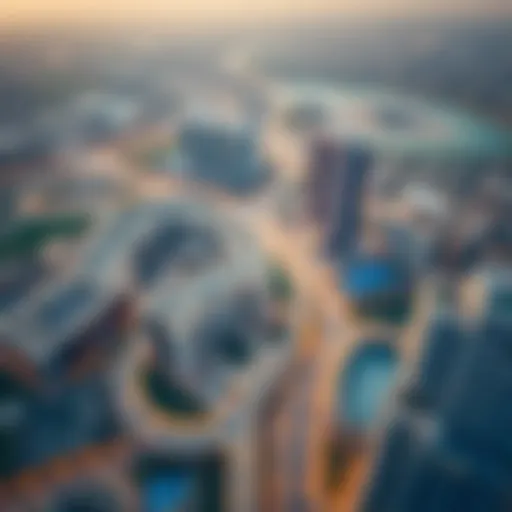Discovering Dubai's Iconic Landmarks and Heritage
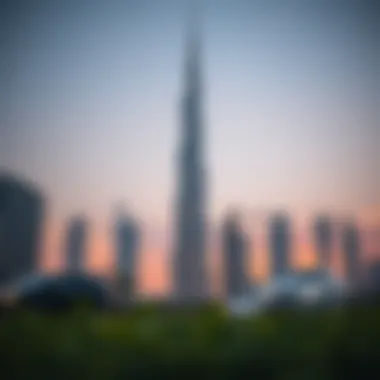
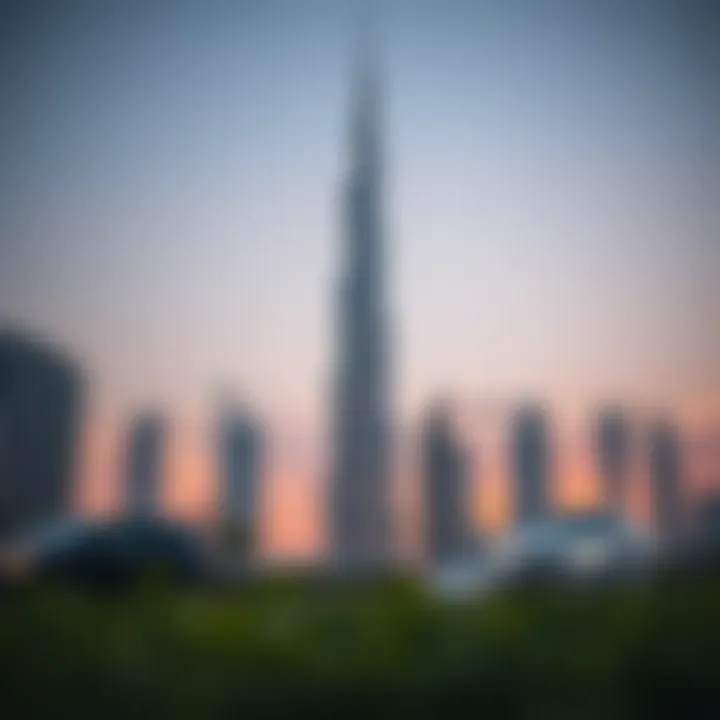
Intro
Dubai, a city often defined by its soaring skyscrapers and extravagant lifestyle, offers a mosaic of experiences that blend old-world charm and cutting-edge innovation. As we wander through its streets and marvel at its landmarks, it's clear that Dubai is much more than just a business hub or a tourist hotspot. It is a city rich in culture, history, and opportunities—a melting pot where the past and future coexist harmoniously.
In this exploration, we will uncover the essential sights that define Dubai's unique identity. From the majestic Burj Khalifa, the tallest building in the world, to the historic alleys of Al Fahidi, each location serves as a testament to the city's rapid evolution while retaining its cultural roots.
Whether you are an investor looking to tap into the burgeoning real estate market, a homebuyer interested in settling in this vibrant city, or simply a curious traveler, this guide aims to provide you with an insightful understanding of Dubai's key attractions. Join me as we delve into these sights; I guarantee there's more than meets the eye in this glittering desert oasis! 😎
Market Trends in Dubai Real Estate
Current Market Overview
The allure of Dubai's real estate market has only grown in recent years. As the population continues to expand and the demand for housing arises, various factors influence the market dynamics. Investors and buyers alike are keenly watching how the blend of modernity and tradition shapes not just the skyline, but also property values.
In 2023, the market shows remarkable resilience, supported by various government initiatives and an increase in foreign investment. Trends suggest a strong competition for properties in prime areas such as Downtown Dubai and Dubai Marina, often leading to bidding wars.
Price Trends and Forecasts
Price tags in certain neighborhoods are certainly eye-catching. Here’s a snapshot of the price trends:
- Downtown Dubai: With its proximity to the Burj Khalifa and the Dubai Mall, prices remain high, generally starting at AED 1.5 million for a studio.
- Dubai Marina: Known for its vibrant atmosphere, average prices hover around AED 1.2 million for one-bedroom apartments.
- Palm Jumeirah: Exclusive villas can go for upwards of AED 10 million, reflecting its status as a luxury destination.
As for forecasts, many experts predict a slight increase in property prices as the city gears up for the upcoming EXPO 2023. Nevertheless, the market's reaction can be unpredictable, so staying informed is key.
Investment Opportunities
Hot Areas for Investment
Astute investors should keep an eye on emerging neighborhoods that offer potential growth:
- Dubai South: This area, particularly around the Al Maktoum International Airport, is set to become a new hub for businesses and commerce, making it ripe for investment.
- Jumeirah Village Circle (JVC): Affordable pricing and burgeoning community facilities make JVC a favorite for new investors and young families.
- Meydan City: Known for its upscale amenities, it’s attracting buyers seeking luxury living.
Rental Yield Analysis
Investing in property for rental income can yield promising returns. Notable observations include:
- Dubai Marina: Offers a rental yield of around 6-7% due to high demand from expats.
- Jumeirah Lake Towers (JLT): Known for its competitive pricing and amenities, it also boasts yields of 5-6%.
- Business Bay: A great choice for investors targeting professionals working in Downtown; rental yields here average around 5%.
Overall, these insights should help prospective investors strategize effectively, whether they lean towards immediate holiday homes or long-term residential properties.
In wrapping up this article, Dubai continues to evolve. Understanding the market trends, investment opportunities, and essential sights unveils the diverse opportunities waiting for those ready to explore.
For further details on the real estate market, one might check resources like Dubai Land Department or recent analyses on sites like Investing in Dubai.
Preface to Dubai's Landscape
Dubai stands as a remarkable example of urban evolution, where the sands of time closely knit together the rich fabric of tradition and the sleek lines of modern architecture. This intricate tapestry is vital to understanding not just the city's aesthetic, but also its cultural significance and economic vitality. For investors and homebuyers, grasping this landscape is essential—if you’re looking to buy property or initiate business ventures, the amalgamation of past and present tells you where the smart investments are
The city’s landscape is not merely a backdrop but a living entity depicting the myriad hues of life in Dubai. With its skyscrapers piercing the clouds and heritage sites calling to those who cherish history, each corner of this metropolis offers insights and opportunities.
The Fusion of Tradition and Modernity
Dubai’s identity manifests through its stunning contrasts. One might stroll through the narrow lanes of the Al Fahidi Historical Neighbourhood, where wind towers stood guard over the past, only to emerge amidst a sprawling urban jungle dominated by structures like the Burj Khalifa. This juxtaposition is no accident; it serves as a deliberate narrative, inviting visitors to appreciate both cultures equally.
The local markets, known as souks, still bustle with the same intensity as they did centuries ago, selling spices, textiles, and gold. In stark contrast, you have the ultra-modern malls showcasing luxury brands and high-tech experiences. This duality extends beyond mere aesthetics; it’s a commitment by Dubai to preserve its heritage while pushing toward innovation. By embodying both facets, Dubai teaches the important lesson that honoring history can coincide with embracing the future.
Why Visit Dubai?
So why visit Dubai? The motivations can be as varied as the city itself. For investors, it presents an intriguing landscape for lucrative opportunities, from real estate ventures to grand tourism projects. Homebuyers are often drawn here to the booming property market, which has continually shifted and evolved, providing various choices for lifestyle improvements.
Culturally, Dubai acts as a gathering point for diverse influences, making it appealing for lovers of gastronomy, art, and adventure. Whether it’s sampling authentic Emirati cuisine or attending a contemporary art exhibition, the city promises engagement on multiple levels. Dubai also hosts world-class events—from fashion weeks to film festivals—which are a magnet for trendsetters.
In summation, whether your interest lies in investment, living amidst a vibrant culture, or simply embarking on an adventure full of unique experiences, Dubai offers multifaceted reasons to visit. For those keen on understanding not just the sights but the significance behind them, exploring the landscape is an engaging starting point.
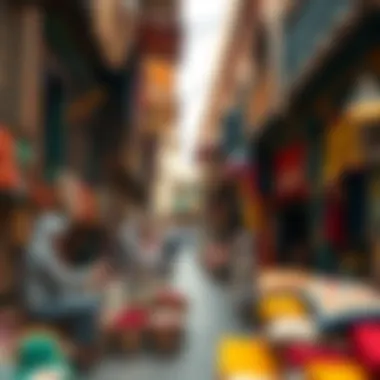
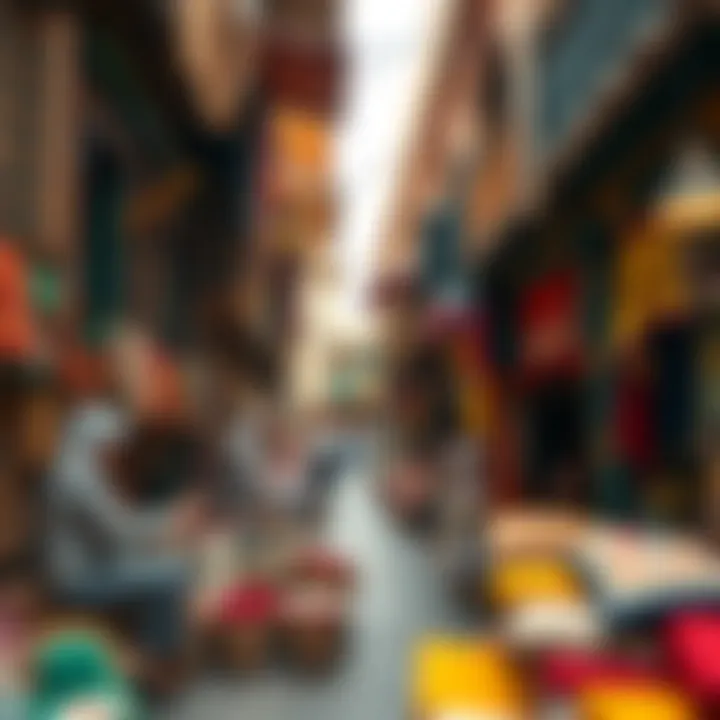
Architectural Marvels
Architectural marvels are not just bricks and mortar; they are the lifeblood of a city’s culture and identity. In the case of Dubai, these structures reflect its transformation from a modest trading port into a global architectural playground. Showcasing cutting-edge designs, engineering feats, and luxurious aesthetics, the architectural landscape here embodies not only innovation but also the spirit of a city thriving on ambition and globalization. For investors, homebuyers, and real estate agents, grasping the significance of these marvels can provide insight into market trends and value propositions that define the real estate landscape.
Burj Khalifa: The Pinnacle of Innovation
The Burj Khalifa stands tall, literally and figuratively, as a beacon of human achievement and contemporary design. This skyscraper not only dominates the skyline but is also a testament to what's possible when vision meets execution. Standing at a staggering height of over 828 meters, it is the tallest building in the world. The building isn't just about its height; the design draws inspiration from the local flora and is engineered to withstand the region's climate.
As an investor, the Burj Khalifa symbolizes the premium sector of Dubai's real estate market. With luxury apartments featuring breathtaking views, there's an undeniable allure for high-net-worth individuals. The observation deck on the 148th floor provides a mesmerizing panoramic view, solidifying the Burj Khalifa's status as a must-visit attraction. From its role as a hub for elite celebrations to its organic connection with companies headquartered in its vicinity, this marvel provides both aesthetic pleasure and economic value.
Burj Al Arab: Symbol of Opulence
Standing on its own island, the Burj Al Arab isn't just a hotel; it's often regarded as the epitome of luxury. Designed to resemble a billowing sail, this unique structure is a beacon of Dubai's commitment to spectacular architecture. Often heralded as the world’s only seven-star hotel, it offers unparalleled services and amenities, making it a favorite choice among celebrities and those seeking the best of the best.
Investors looking at high-end residential or hospitality markets should pay close attention to the impact of the Burj Al Arab on tourism and local commerce. The establishment’s brand is synonymous with luxury, thereby influencing real estate values in the areas surrounding it. Visitors not only come for the lavish stay but to dine in its extravagant restaurants, securing the Burj Al Arab's position as both a tourist attraction and a vital part of Dubai’s economy.
Dubai Frame: A Window to the Past and Future
The Dubai Frame symbolizes the city's journey—one leg planted firmly in history and the other reaching for the future. This architectural structure offers visitors a unique vantage point to look back at the city's humble beginnings in old Dubai and forward into its ambitious plans for the future. At 150 meters tall, it serves as a literal and metaphorical window that connects the city's rich past with its vibrant present.
Incorporating elements of interactive technology and design, the Dubai Frame is not just an attractive sight but also an educational experience. For potential investors, it's essential to recognize the rebranding efforts that venues like the Frame inspire. They can drive up interest in nearby properties, as people flock to see not just the Frame’s distinctive design but also the cultural messages it embodies. This dual importance highlights how effectively integrating history into modern developments can enrich a city’s narrative, ultimately impacting property demand and values.
"Architectural marvels like the Burj Khalifa, Burj Al Arab, and Dubai Frame do not merely enhance the skyline; they carve the identity of Dubai, making them critical assets in understanding the city's real estate dynamics."
By exploring these architectural wonders, investors can glean insights into market trends that set the tone for Dubai's evolving landscape. Each structure exemplifies different facets of luxury, innovation, and historical reverence, creating a tapestry that is as intricate as it is captivating.
Cultural Destinations
Cultural destinations in Dubai play a pivotal role in shaping the emotional and intellectual landscape of the city. They offer a lens through which visitors can peer into the rich tapestry of Emirati heritage, art, and communal spirit. These sites are not mere tourist traps but rather, gateways to understanding the past, present, and future of a city that is often perceived as overwhelmingly modern. Through these venues, one can appreciate how the intricate blend of tradition and contemporary life coexists, enhancing the city's global appeal. For investors, this cultural aspect can directly influence property values, as neighborhoods with cultural significance tend to attract more interest.
Dubai Museum: Unraveling the City's History
Situated in the heart of Dubai, the Dubai Museum is housed in the Al Fahidi Fort, which dates back to 1787. It's a treasure trove of the city’s transformation from a modest fishing village into a global powerhouse. The museum’s exhibits vividly depict the daily life of old Dubai, showcasing traditional artifacts, dioramas, and multimedia displays.
Visitors can stroll through recreated scenes of the souks, or traditional markets, where spices and textiles once traded hands. The place executes a fine job of narrating how oil discovery reshaped not just the physical landscape but the socio-economic fabric of the UAE.
- Highlights of the Museum:
- Ancient Pottery and Artifacts: Offering glimpses of the region's earliest civilizations.
- Cultural Displays: Such as traditional music and dance, showing the vibrancy of local customs.
- Interactive Zones: Where visitors can partake in workshops to learn about traditional crafts.
In essence, the Dubai Museum is not merely a collection of artifacts; it's a narrative space where the echoes of the past still resonate.
Al Fahidi Historical Neighborhood: A Step Back in Time
Stepping into the Al Fahidi Historical Neighborhood is like flipping the pages of a history book. Here, narrow lanes lined with wind-tower architecture tell tales of a bygone era, transporting visitors to the time before skyscrapers dominated the skyline. This district preserves the essence of traditional Emirati life, offering a unique juxtaposition to the dazzling modernity surrounding it.
Interestingly, local artists and craftsmen utilize the area to showcase their work, turning this neighborhood into a living gallery. This not only provides a platform for cultural expression but also fosters a sense of community that thrives on shared heritage. It’s a place where one can indulge in the charm of art galleries, quaint cafes, and boutique shops, all while absorbing the authenticity that lingers in the air.
- Notable Spots to Explore:
- Sheikh Mohammed Centre for Cultural Understanding: Engaging programs aimed at fostering dialogue about Emirati customs and traditions.
- Bastakiya: Featuring art exhibitions that delve into both contemporary and historic aspects of Emirati life.
- Community Events: Often held to promote local artisans and cultural storytelling.
For potential investors, this neighborhood signifies a growing interest in historically rich locations, which often come with increased demand for properties that celebrate cultural identity.
Sheikh Mohammed Centre for Cultural Understanding: Bridging Cultures
Established with the aim of fostering better understanding between cultures, the Sheikh Mohammed Centre for Cultural Understanding stands as a beacon for inclusivity and dialogue. Nestled within the Al Fahidi Historical Neighborhood, the centre offers various programs that encourage visitors to engage in conversations about local customs, history, and culture.
The format includes traditional meals, guided tours, and cultural workshops where attendees can learn to craft Arabic coffee or understand the significance of Emirati attire. It’s a harmonious blend of learning and sharing that opens doors to a deeper appreciation of the UAE’s rich heritage.
- Popular Programs Include:
- Cultural Meals: Offering a taste of authentic Emirati cuisine in a communal setting.
- Q&A Sessions: Where questions about Islam, Emirati customs and traditions are welcomed, allowing for enriching conversations.
- Guided Tours: Providing insights into cultural landmarks and their significance.
This center not only enhances the visitor experience but also provides investors with insight into the ongoing and emerging cultural trends within Dubai, making it an essential stop on any cultural itinerary.
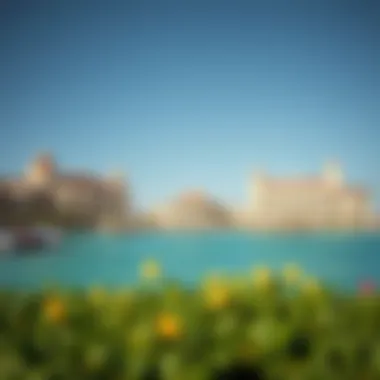
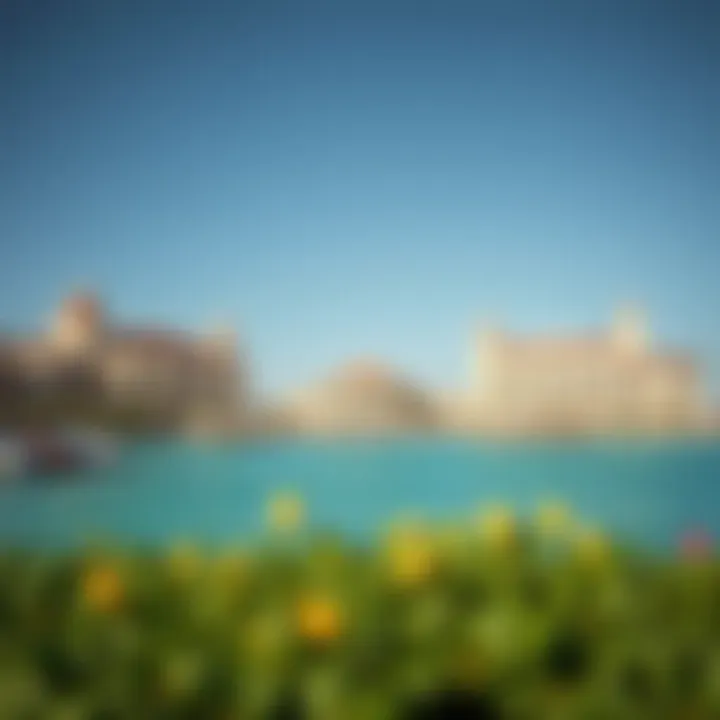
Natural Wonders
Natural wonders are not the first thing one thinks of when considering Dubai. However, this city, known for its ultra-modern architecture and luxurious lifestyle, is also home to some of the most breath-taking environments that add layers to the city’s allure. Understanding these natural sights can offer investors, homebuyers, and real estate agents an enriched perspective on what makes Dubai not just a place to work, but also a place to unwind and connect with nature.
The beauty of these natural sites lies in their contrast to the urban sprawl. They serve as a reminder that amid the steel and glass, there are serene locations that ground visitors in a different kind of magic. These areas can provide potential investors with unique opportunities, enhancing property values around desirable natural attractions.
Desert Safari: Experiencing the Expanse
A desert safari in Dubai is an adventure like no other. This experience takes you into the heart of the Arabian desert, where the golden sands stretch endlessly beneath the vast blue sky. Imagine riding the dunes in a 4×4, feeling the adrenaline surge as you conquer the high peaks of sand.
The desert safari isn’t just about the thrill, though. It's an immersion into a world that has shaped the culture and history of the region. Guests can engage in traditional activities, such as camel riding and falconry, which has profound ties to Emirati heritage. Dinner under the stars, accompanied by belly dancing and Arabian music, transforms a simple outing into a captivating cultural experience.
- Benefits of a desert safari:
- Unique experience: It’s a chance to explore an ecosystem not found elsewhere.
- Cultural engagement: A way to touch base with local traditions and history.
- Networking: Opportunities for socializing with like-minded individuals, possibly leading to real estate connections.
"There’s something humbling about the desert that puts life into perspective. It’s where silence speaks louder than words."
Dubai Marina: A Blend of Nature and Luxury
Dubai Marina presents a mesmerizing juxtaposition of calm waters and skyscrapers. With its palm-shaped coastline along the Gulf, this area is dubbed a land of both comfort and allure. Walking along the Marina Walk, one can find a medley of cafes, shops, and residences, all bustling with energy. The stunning yachts docked in the water further enhance the luxurious vibe of the marina.
For homebuyers, properties here offer unrivaled views and close proximity to both business districts and leisure establishments. The waterfront lifestyle associated with Dubai Marina appeals especially to young professionals and families, positioning it as a prime area for investment.
- Reasons to explore Dubai Marina:
- Recreational opportunities: From water sports to tranquil walks, it caters to many lifestyles.
- Dining options: An array of restaurants offering diverse cuisines, perfect for entertaining clients or indulging in family dinners.
- Vibrant atmosphere: Evening illuminations make it a hotspot for nightlife.
Miracle Garden: A Floral Wonderland
Miracle Garden offers a surreal experience that stands in stark contrast to the typical images of Dubai. Covering over 72,000 square meters, it’s the world’s largest natural flower garden. With over 150 million flowers arranged in creative and artistic ways, it attracts thousands of visitors every season. Each design showcases intricate artistry, showing how nature can be an exceptional form of expression.
For real estate agents and investors, proximity to such unique attractions can be a selling point for potential clients. The garden draws tourists, which can increase foot traffic to nearby residential listings.
- Highlights of Miracle Garden:
- Seasonal displays: Every winter, new themes are introduced, keeping the attraction fresh.
- Instagrammable spots: Photographers and influencers love to capture the vivid scenery, adding to social media buzz and visibility for the area.
- Family-friendly: It provides a wholesome environment for families, making it an attractive location for residential development.
In summary, the natural wonders of Dubai add significant value to its identity as a vibrant city. They not only enhance the quality of life for residents but also offer unique opportunities for investors and homebuyers alike. The melding of nature with the urban landscape creates a compelling reason for visitors and residents to fall in love with this city.
Shopping Experiences
Shopping in Dubai is more than just a way to spend money; it reflects the city’s dynamic blend of heritage and modernity. Visitors to this vibrant city find not only a wide variety of luxury goods but also unique market experiences that embody the local culture. This section highlights the various shopping options available, emphasizing the reasons why Dubai has established itself as a retail hub on a global scale.
The Importance of Shopping in Dubai
Shopping here isn’t merely transactional; it’s an experience in itself. For investors and homebuyers, understanding Dubai’s shopping landscape can provide insights into the lifestyle and preferences of potential residents, which may influence real estate decisions. The retail scene is intricately linked to tourism; thus, being well-versed in shopping experiences can also help real estate agents tailor their offerings.
- Economic Significance: Shopping contributes significantly to Dubai’s economy, drawing millions of tourists annually who indulge in shopping sprees during events like the Dubai Shopping Festival.
- Cultural Exposure: Large malls are complemented by traditional souks, showcasing the rich tapestry of local craft and culture. Understanding these options adds to the allure of the city for potential homebuyers and investors.
- Social Attractions: Shopping centers often serve as social hubs, with cafes, entertainment options, and cultural events attracting residents and visitors alike.
"Dubai’s shopping experience is a fusion of luxury and local culture, making it a must-visit for any keen traveler."
Dubai Mall: A Shopper's Paradise
The Dubai Mall redefines what it means to shop. As one of the largest malls in the world, it boasts a breathtaking array of retail outlets, from high-end designer stores to quirky boutiques. It’s not just shopping; it's an experience that can consume an entire day.
- Key Highlights: With over 1,200 retail shops, the mall features attractions like the Dubai Aquarium and an ice rink, providing variety beyond just shopping.
- Dining Options: Visitors can choose from a wide range of dining establishments, from casual eateries to high-end restaurants, catering to all tastes and budgets.
The Dubai Mall stands as a testament to modern retailing while also serving as a microcosm of the city’s vibrancy. For those considering investments in the vicinity, the foot traffic generated by this mall is an important factor to consider.
Gold Souk: The Heart of Gold Trading
The Gold Souk offers a completely different experience compared to the modern malls. Located in the bustling old district of Deira, this market showcases hundreds of shops that specialize in gold jewelry, making it one of the richest markets in the world.
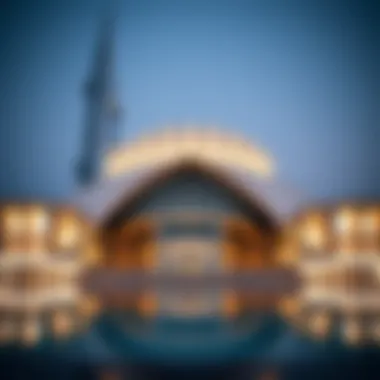
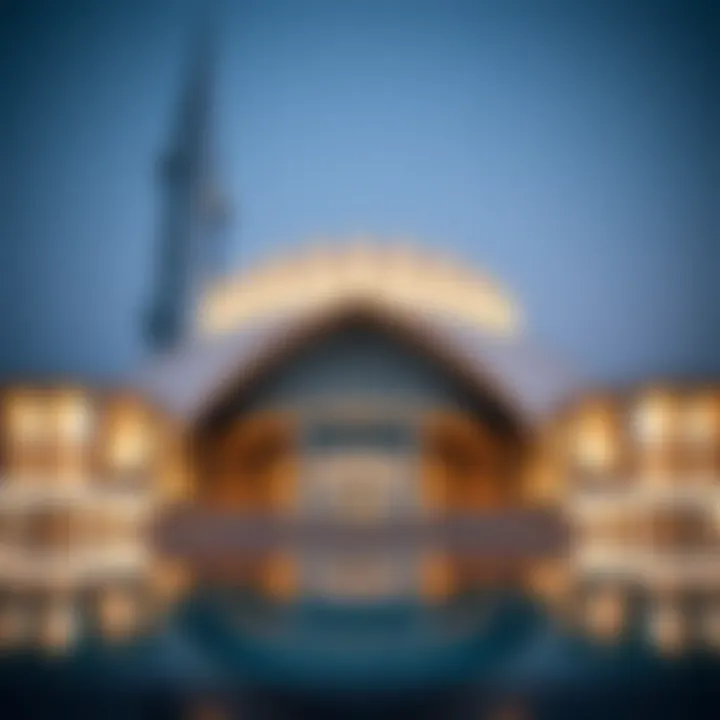
- Cultural Significance: The Gold Souk represents more than just commerce. Each piece of jewelry tells a story, rooted in the collaborative history of trade and craftsmanship.
- Haggling as an Art: Visitors are encouraged to haggling. This cultural practice not only makes shopping an interactive experience but can lead to significant savings as well.
For real estate agents, highlighting proximity to traditional markets like the Gold Souk can attract buyers interested in the blend of contemporary luxury and historic charm that Dubai offers.
Mall of the Emirates: Retail and Entertainment Combined
The Mall of the Emirates is another shopping giant with its own unique twist. Besides shopping, it offers various entertainment options, including Ski Dubai, an indoor ski slope that is quite the novelty in the desert.
- Diverse Retailers: With a plethora of international and regional brands, it provides a comprehensive shopping experience suitable for all.
- Entertainment Venues: From movie theaters to the Magic Planet family entertainment center, this mall serves as an entertainment hub for visitors and locals alike.
The Mall of the Emirates adds depth to Dubai’s shopping narrative, making it essential for investors to seize opportunities in nearby properties that benefit from this influx of visitors.
In summary, Dubai's shopping scene weaves together luxury, culture, and social interaction, making it a pivotal point for understanding the city’s economy and lifestyle as a whole. Investors, homebuyers, and real estate professionals must keep the diversity and vibrancy of Dubai's retail landscape at the forefront of their considerations.
Recreational Attractions
Recreational attractions serve as the heartbeat of Dubai's tourism landscape, offering a myriad of activities that draw adventure enthusiasts, families, and thrill-seekers alike. In a city known for marrying tradition with cutting-edge innovation, these attractions provide an escape, a place to unwind or unleash adrenaline. From exhilarating water slides to indoor skiing, Dubai certainly knows how to cater to diverse tastes.
Each recreational site not only entertains but also contributes significantly to the local economy, enhancing Dubai's appeal as a prime destination for both tourists and investors. Understanding these attractions can help prospective homebuyers and real estate agents appreciate the long-term value they add to nearby properties. These venues are not just places for temporary enjoyment; they are integral to a lifestyle built around leisure and luxury.
Aquaventure Waterpark: Thrills and Relaxation
Aquaventure Waterpark, located at Atlantis, The Palm, is a hallmark of excitement wrapped in stunning aquatic designs. With wave pools, lazy rivers, and record-breaking water slides, this park stands out among Dubai's lavish offerings.
One of the park's crown jewels, the Leap of Faith, delivers a heart-pounding plunge through a transparent tunnel surrounded by sharks and rays. This not only caters to thrill-seekers but also serves as a reminder of the marine life that Dubai prioritizes in its tourism, creating a connection between fun and environmental awareness.
Families can relish the interactive play areas designed for younger children, ensuring fun for all ages. The importance of Aquaventure extends beyond recreation; it brings together tourists and locals, creating a sense of community.
"In a place like Dubai, where luxury often overshadows leisure, Aquaventure reminds us that enjoyment and relaxation are just as valuable."
IMG Worlds of Adventure: Indoor Theme Park Experience
For those who prefer escaping the desert heat, IMG Worlds of Adventure offers an exhilarating indoor experience that promises to transport visitors into fantastical realms. As the largest indoor theme park globally, it caters to every whim -- from Marvel superheroes to dinosaurs roaming in the prehistoric section.
The Velociraptor roller coaster provides a thrilling ride, while the immersive entertainment elements blend storytelling with excitement, engaging visitors in a unique way. This attraction showcases Dubai's ambition to diversify its appeal, making it a hot spot not only for tourism but also a magnet for real estate investments.
Investors might take interest here, as attractions like IMG can potentially drive property demand in the surrounding areas, with families gravitating toward neighborhoods rich with leisure options.
Ski Dubai: Unconventional Winter Sports
Ski Dubai in the Mall of the Emirates is a marvel that embodies the unexpected juxtaposition of the desert and winter sports. This indoor ski resort offers an artificial environment where one can ski, snowboard, or simply enjoy the chill amidst the hot desert sun.
Entering Ski Dubai is like stepping into another world -- a snow-covered landscape complete with real snow, a chair lift, and even penguins. These experiences not only draw sports enthusiasts but also families looking for unique thrills, further establishing Dubai as an all-encompassing destination.
Real estate agents might note that such attractions are pivotal when considering property buyers, as living near indoor recreational activities enhances quality of life and convenience, making areas surrounding Mall of the Emirates particularly desirable.
In summarizing the recreational offerings, it’s clear that each attraction — be it Aquaventure, IMG Worlds, or Ski Dubai — adds layers of excitement to Dubai’s cultural fabric. They don't merely serve as pastimes; they are significant contributors to economic investment and the overall allure of the city, appealing to investors, homebuyers, and real estate professionals alike.
Ending: Capturing the Essence of Dubai
As we draw to a close, it’s clear that the essence of Dubai is a multifaceted tapestry woven together by its mesmerising attractions, cultural heritage, and modern innovations. This article captures the pulsating heart of Dubai, revealing how each sight contributes to a greater narrative; one that embodies the resilience and ambition of its people. In understanding Dubai’s attractions, readers gain insights not just into the sights themselves, but also the experiences and lifestyles they foster.
The Impact of Dubai's Attractions on Real Estate
Dubai's skyline is more than a mere collection of buildings. Each structure represents a wealth of opportunity that resonates deeply within the real estate market. The allure of architectural wonders like the Burj Khalifa and the luxury of the Burj Al Arab have attracted investors from across the globe. This influx has, in turn, driven property values upwards, creating a robust environment for both residential and commercial investments.
Moreover, attractions like Dubai Mall and Miracle Garden serve as magnets for tourists, which directly influence rental incomes for property owners. Investors are increasingly keen to capitalize on these trends by creating portfolios that align with the city's explosive growth. On average, a well-placed property near a major attraction can yield rental returns that are better than many global cities, emphasizing the strategic value of Dubai's location and its vibrant lifestyle offerings.
Future Trends in Dubai's Development
Looking forward, Dubai’s development trajectory promises to soar even higher. The city has set its sights on becoming an even more significant global hub for business, tourism, and innovation. One of the key trends includes the expansion of smart city initiatives, which aim to increase sustainability and enhance the quality of living.
The upcoming Expo 2020 site is evolving into a commercial district that is likely to redefine Dubai's economic landscape. Increased investments in technology, such as artificial intelligence and blockchain, will not just place Dubai at the forefront of innovation but also influence real estate demand and pricing structures. Developers are likely to focus on eco-friendly and energy-efficient buildings, catering to an audience that prioritizes sustainability.
"Dubai is a city of the future, but steeped in history—each new project builds a bridge between the rich past and the promising future."
As trends such as remote work gain traction, there will also be a push for mixed-use developments that integrate workspaces and living areas, thus reshaping how communities in Dubai interact. The interpretation of what constitutes an ideal living environment will evolve as the younger generations, who are adept at leveraging technology, make their preferences known.
In summation, the implications of Dubai's attractions stretch far beyond the confines of tourism; they reshape real estate dynamics and dictate upcoming development trends. Investors, homebuyers, or anyone involved in real estate should remain vigilant and prepared to adapt to these changing landscapes, ensuring they don't miss out on the opportunities that arise within this vibrant city. For further exploration of real estate trends in Dubai, visit resources like Wikipedia or Britannica.
Engaging with the unfolding narrative of Dubai will not only enhance understanding of its attractions but also empower wise decisions in a rapidly evolving market.
